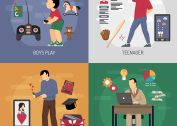Studying effectively has always required more than just spending long hours at a desk. Success depends on having the right strategies to focus, retain information, and adapt when challenges arise. In 2025, students are turning to a powerful new approach known as AI-enhanced self-regulated learning, which is reshaping the way they prepare for exams, complete assignments, and master new skills.
This approach combines traditional learning science with artificial intelligence tools that track progress, suggest improvements, and keep learners on course. It is quickly becoming one of the most reliable systems for building effective study habits for students, helping learners not only perform better academically but also develop essential life skills such as discipline, time management, and resilience.

What Is AI-Enhanced Self-Regulated Learning?
Self-regulated learning (SRL) refers to a student’s ability to plan, monitor, and reflect on their learning process. Instead of simply following instructions from teachers, students using SRL take charge of their education by setting goals, staying aware of progress, and adjusting strategies when needed.
AI enhances this process by offering data-driven insights and personalized guidance. Instead of guessing what works, students now have access to intelligent tools that can:
- Identify weaknesses by analyzing test and quiz results
- Recommend tailored study plans based on performance trends
- Provide adaptive quizzes that adjust in real time
- Offer reminders and scheduling support to improve consistency
- Track progress with visual dashboards that show improvement over time
In short, AI acts like a digital tutor, making personalized support accessible to every learner.
Why It’s Trending in 2025
The rise of AI in education is not just hype—it reflects real changes in how students learn and what they expect from their study tools. Several reasons explain why AI-enhanced self-regulated learning is becoming one of the most important trends for building effective study habits for students.
First, access to AI tools has expanded. With platforms like ChatGPT’s study mode and AI-driven flashcard apps, students no longer need to rely solely on textbooks or traditional tutoring. These tools are affordable, easy to use, and available anytime (Business Insider, 2025).
Second, personalized learning has shifted from being optional to being expected. After the pandemic, many students realized that one-size-fits-all teaching was no longer enough. According to a survey, 81% of learners reinvented their study routines with the help of AI-powered tools (Times of India, 2025).
Third, research validates the methods AI promotes. Strategies like spaced repetition, retrieval practice, and active recall have long been proven to improve retention. AI makes them easier to adopt consistently, turning evidence-based techniques into daily habits.
Finally, schools and universities are integrating AI into classrooms. As institutions embrace these tools, awareness spreads, making adoption even faster among students.
Core Elements of AI-Enhanced Self-Regulated Learning
For students who want to make the most of this approach, here are the key components that define success:
- Goal-setting tools – Break down long-term academic goals into daily, manageable tasks.
- Adaptive practice – Engage in quizzes that become more or less challenging depending on performance.
- Spaced repetition – Review material at scientifically determined intervals to strengthen long-term memory.
- Active recall – Test knowledge by recalling information without looking at notes, a proven way to boost retention.
- Progress tracking – Use dashboards and analytics to stay motivated and adjust when necessary.
- Consistency reminders – Rely on notifications that keep study routines on track and reduce procrastination.
These tools together create a learning environment that is not only smarter but also more adaptable.
Building Effective Study Habits with AI
Students can design a practical study routine using AI in the following steps:
- Set clear, specific goals – Instead of vague tasks like “study math,” focus on measurable targets such as “complete 20 algebra practice questions.”
- Choose the right AI tool – Select apps or platforms that provide adaptive learning and progress tracking. Popular choices include AI-driven flashcard apps, essay feedback tools, and digital study planners.
- Incorporate retrieval practice – Use AI quizzes to test understanding rather than rereading notes.
- Apply spaced repetition – Allow the system to remind you when to review material for maximum retention.
- Review weekly progress – Reflect on strengths and weaknesses to refine future study plans.
- Balance technology with wellness – Pair AI tools with offline focus strategies, regular breaks, proper sleep, and exercise.
Benefits for Students
The adoption of AI-enhanced self-regulated learning offers benefits that extend beyond academics. Students report:
- Greater efficiency – Focused practice saves time compared to unfocused cramming.
- Personalization – Strategies adapt to unique learning preferences and paces.
- Improved memory retention – Spaced repetition and recall exercises strengthen long-term knowledge.
- Higher motivation – Visualizing progress keeps students engaged.
- Transferable skills – Self-regulation prepares learners for careers and lifelong learning.
In an increasingly competitive environment, these benefits provide students with a crucial edge.
Mistakes to Avoid
Despite its potential, this approach is not without risks. Students should avoid:
- Overreliance on AI – Technology should guide, not replace, human judgment and critical thinking.
- Neglecting reflection – Real self-regulation requires thinking about why strategies work, not just following prompts.
- Juggling too many apps – Simplify by sticking to one or two effective platforms.
- Ignoring health – Poor sleep, nutrition, and stress management can undermine even the smartest study plan.
Why This Matters for the Future of Education
The shift toward AI-enhanced study habits reflects a broader trend in education: the movement toward personalized, data-driven learning. Students are no longer limited to memorizing facts or reviewing notes without strategy. They now have tools that help them understand how they learn best, making studying not only more effective but also more sustainable.
Teachers also benefit, as they can use AI data to identify class-wide weaknesses and provide better support. Parents gain insight into their children’s progress, while students themselves become more independent and confident learners.
Conclusion
In 2025, effective study habits for students are no longer about who studies the longest but about who studies the smartest. AI-enhanced self-regulated learning is revolutionizing the academic experience by combining proven methods with intelligent tools that guide learners toward consistent improvement.
Whether you are preparing for an exam, balancing multiple courses, or pursuing career certifications, building these habits will set you apart. By blending traditional discipline with advanced technology, today’s students are preparing not only for academic success but also for the future of work and lifelong learning.
References
- A qualitative systematic review on AI empowered self-regulated learning in higher education, https://www.nature.com
- Exploring How AI Literacy and Self-Regulated Learning Relate to Student Writing Performance and Well-Being in Generative AI-Supported Higher Education, https://www.mdpi.com
- Enhancing self-regulated learning and learning experience in generative AI environments: https://bera-journals.onlinelibrary.wiley.com









